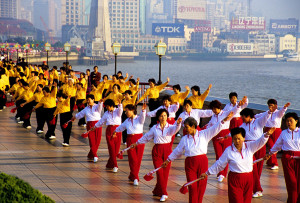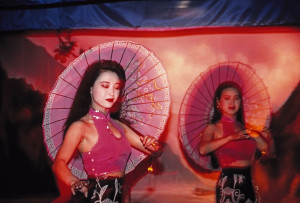
Morning exercise teams on Shanghai’s Bund, along the Huangpu River waterfront. Photo by Dennis Cox/WorldViews
First in a Series:
Having just returned from a 12-day trip to China, in which my wife, Catharine, and I traveled independently for much of the time, I wanted to pass along some tips, cautionary information, and interesting factoids for anyone planning to visit that fascinating country in the reasonably near future — especially if you’re planning to do some independent travel.
(China is changing so fast that I can’t guarantee some things won’t be completely different a year from now.)
Our goal for the trip was to take a five-day, four-night Yangtze River cruise via Victoria Cruises, the only American-owned cruise line on the Yangtze — I’ll have an account of that in a later post. But first we wanted to stay several days in Shanghai — which I’ll be detailing later as well — and two days in Yichang, the city where the river cruises embark or disembark, depending on whether you’re going upstream or downstream.
We also spent time in Chongqing, where our cruise disembarked. In all three cities, we were on our own.
I had traveled to China twice before, in 1993 and 1999, both times in the company of photographer Dennis Cox, a long-time China specialist who has traveled there dozens of times and led numerous photo tours there, so I mostly had to show up and research the stories I was working on back then.
This time I had to really pay attention and know what I was doing. It was Catharine’s first time in China, and I wanted our trip to go as smoothly as possible.
Here are ten things I learned this trip:
- Bring your own paper products. The Chinese don’t seem to have much use for them. That includes tissues, napkins. and toilet paper. You might find tiny paper napkins in a restaurant, but often not even those. Hotels may have tissues but they’re often tiny as well. (And since I came down with a cold midway through the trip, I quickly found out how insubstantial they are.) The lack of toilet paper in public toilets is a plague in many parts of the world, including at the U.S. at times, but it’s an epidemic in China.
- The Chinese often don’t drink during meals, and that includes tea, which we were seldom served with our food in restaurants. Tea bags and kettles were common in hotel rooms, and coffee, tea, and juices were plentiful in hotel breakfast buffets, but at lunch and dinner a pot of tea seldom appears. (Many Chinese carry their own bottles of teas around all day.) Beer is often served warm, as are soft drinks and water (water dispensers in the Shanghai airport offer three settings: warm, warm, and hot; it’s a good idea to carry chilled bottled water wherever you go). Along similar lines, we seldom saw soy sauce, salt and pepper, or other sauces and condiments on restaurant tables at lunch or dinner.
- There is very little tipping in China. Taxi drivers, restaurant servers, and most hotel personnel don’t expect to be tipped — some might even regard it as an insult. Local tourist guides do depend on tips, however, and will let you know it, so bring some smallish bills along if you take any tours.
- If at all possible, have someone who knows Chinese write the names of your hotels or other key destinations down in Chinese characters, to show to tax drivers who don’t speak or understand English. “Please take me to [name of hotel and address]” will work wonders if written in Chinese. We’re lucky enough to have a Chinese friend in the U.S. who took care of this chore for us; some hotel staff members in China may be able to help as well. (If you have them write “Please take me to the airport” in Chinese, make sure they include the name of the airport, since some cities have two or three.)
- Don’t count on many people speaking English outside of cities like Shanghai, which has a big expatriate population. (Most people in Shanghai don’t speak English, either, but many service people do.) You’ll be hard put to find an English-language menu as well; often you just have to point to the pictures on the menu or the food itself if you see it cooking in a pot or swimming around in a fish tank. Sometimes this results in surprise meals, but it’s also a way of trying new foods, however unintentionally. To play it safe, ask for or point to noodle dishes, which are almost always delicious. or follow the advice of frequent China traveler Dennis Cox: “In restaurants, never ask what something is until after you’re eaten it. And never look in the kitchen.”
- Expect the Chinese people to be very friendly to Americans and other Westerners. We never heard a bad word about the U.S. during our entire stay. A number of Chinese went out of their way to help us when we looked lost or confused (probably much of the time). This was one of the most memorable and inspiring aspects of our trip.
- If you want to get away from cell phones, you’ve come to the wrong place. In Shanghai, they’re virtually ubiquitous, with half the population staring down at their phones while they walk or ride the subway, and the other half taking selfies with their phones, often employing long selfie sticks. You might also be asked to pose for pictures, which may seem odd, but in many parts of China Western visitors are still, well, an oddity.
- Speaking of the Shanghai subway, it’s modern, fast, efficient, and easy to use once you catch on to a couple of potential pitfalls. Rather than buy single-ride tickets from the hard-to-decipher machines at the “Metro” entrances, go to the “Passenger Services” booths and request a one-day or multi-day pass — these booths have English-speaking agents, and the passes are easy to use and can save money. Also, if the subway car lights dim twice at a particular station, it means you’ve reached the end point of that train and it may start going in the opposite direction, even if you haven’t reached the end of the subway line itself. (Yes, this happened to us on the way in from the airport.)
- Much of the Chinese transportation infrastructure — sparkling new airports, train stations, and highways — puts many of those in the U.S. to shame. Returning home to the chaos of New York’s JFK airport after our trip, it seemed like the Third World compared to the airports in Beijing and Shanghai. China also has bullet trains that match the speeds of those of Japan, cutting down travel times by hours or even days. Of course, if the Chinese government wants to build a new highway, say — or displace more than a million people to build an enormous dam, as they did along the Yangtze — they just do it without any political opposition.
- For some reason, the Chinese announcements in airports, train stations and on subway cars always seem louder than the announcements in English, which are often hard to hear or understand over the usual din. Keep checking the boards for the frequent gate changes in airports, pay close attention to the subway maps (only some of which are in English) before boarding the train, and watch for the people sitting near you to start scrambling toward the gate when the Chinese announcement says it’s time to board your train.
- BONUS TIP: If you’re a baby boomer of a certain age (usually 65 and up), many attractions offer senior discounts; watch for signs at ticket windows and be sure to carry ID, either passports or driver’s licenses.
After perusing this list, you may well decide that your best bet for traveling in a China is taking a tour — as most people do. Traveling on your own in China is definitely a challenge, but it’s also an adventure — and a great way to meet the Chinese. We had some wonderful random encounters with locals that helped make our trip. But if you’re looking to keep your stress levels low, a guided tour is probably the ticket.
In another year’s time, though, that may all change. The Chinese are figuring out the travel business, fast. Don’t underestimate their ability to accommodate the needs of Westerners — though providing sufficient napkins, tissues, and toilet paper may be asking too much.
Next up: Shanghai
Readers: You can subscribe to my blog and get notification of every post by simply typing in your email address and clicking on the blue Subscribe button or downloading my free report, How to Ride the Coming Wave of Boomers. Thanks!














Leave a Reply